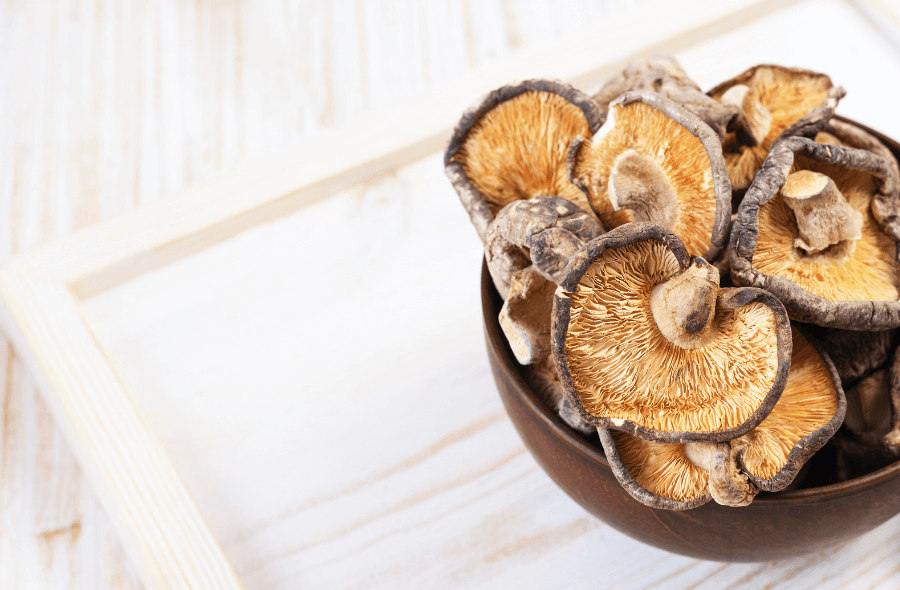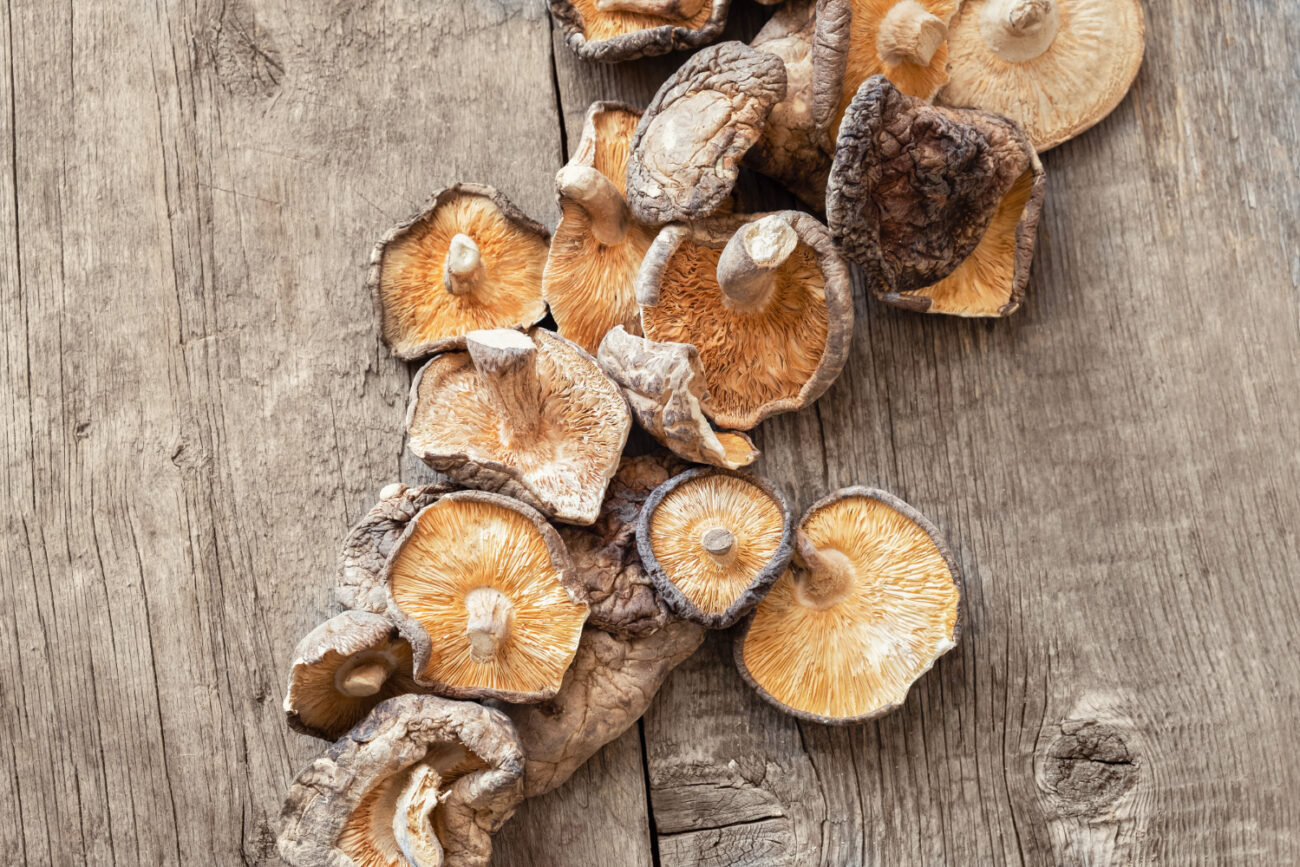Shiitake mushrooms (Lentinula edodes) have been a staple in Asian cuisine and traditional medicine for centuries. Known for their rich, savory flavor and impressive health benefits, these mushrooms are now widely recognized around the world as a functional food—meaning they offer more than just basic nutrition.
Whether you enjoy them sautéed, in soups, or as a supplement, shiitake mushrooms are worth getting to know. In this post, we’ll explore their nutritional properties, health benefits, and any potential risks or contraindications you should be aware of.
What Are Shiitake Mushrooms?
Shiitake mushrooms are native to East Asia and grow naturally on decaying hardwood trees. The name “shiitake” comes from the Japanese words shii (a type of tree) and take (mushroom).
They are prized for their umami flavor, meaty texture, and a wide range of bioactive compounds that offer therapeutic benefits.
Nutritional Properties of Shiitake Mushrooms
Shiitake mushrooms are low in calories but rich in nutrients, making them a great addition to almost any diet.
Key Nutrients (per 100g cooked):
- Calories: ~35 kcal
- Protein: 2.2 g
- Carbohydrates: 7 g
- Fiber: 2.5 g
- Fat: <0.5 g
- Vitamins: B2 (riboflavin), B3 (niacin), B5 (pantothenic acid), D (especially when sun-dried)
- Minerals: Copper, selenium, manganese, zinc, and phosphorus
They also contain lentinan, a unique polysaccharide with immune-boosting properties, and ergothioneine, a powerful antioxidant.
Health Benefits of Shiitake Mushrooms
1. Boosts Immunity
Shiitake mushrooms contain beta-glucans and lentinan, compounds known to stimulate immune cell activity. Lentinan has been studied for its antiviral and anticancer potential, especially in supportive cancer therapy in some Asian countries.
2. Supports Heart Health
- Lowers cholesterol: Shiitakes contain eritadenine, which may help reduce blood cholesterol levels.
- Reduces inflammation: Their antioxidant and anti-inflammatory compounds support overall cardiovascular health.
3. Antimicrobial and Antiviral Properties
Shiitakes have natural antimicrobial compounds that may help fight infections. Some studies suggest antiviral activity, including against influenza and herpes viruses.
4. Rich in Antioxidants
They contain ergothioneine and selenium, which protect cells from oxidative stress, potentially reducing the risk of chronic diseases like cancer, Alzheimer’s, and heart disease.
5. Supports Bone Health
Sun-dried shiitakes are one of the few plant-based sources of vitamin D2, which helps maintain healthy bones and immune function.
6. May Have Anti-Cancer Effects
Lentinan has shown promise in studies for slowing tumor growth and enhancing the immune system’s ability to fight cancer cells. It has been used as an adjuvant therapy for gastric and colorectal cancer in Japan.
Contraindications and Side Effects
While shiitake mushrooms are generally safe for most people, there are some important precautions to consider.
1. Shiitake Dermatitis
- A rare skin reaction caused by eating raw or undercooked shiitake mushrooms.
- Symptoms: itchy, red, linear streaks that resemble whiplash marks.
- Caused by lentinan and usually resolves within a week.
2. Allergic Reactions
- Some people may develop allergies to mushrooms, especially with long-term occupational exposure or supplementation.
- Symptoms may include rashes, breathing difficulties, or gastrointestinal distress.
3. Interaction with Medications
- Immunosuppressive drugs: Shiitakes stimulate the immune system, so they may interfere with immunosuppressants.
- Blood thinners: Their vitamin K content may interact with anticoagulant medications.
4. Not Suitable for Everyone
- Autoimmune disorders: Due to immune-stimulating effects, people with autoimmune conditions (like lupus or rheumatoid arthritis) should consult a doctor before using medicinal mushroom supplements.
- Pregnant or breastfeeding women: There’s limited data on high-dose shiitake supplementation, so it’s best to consume them as food, not in concentrated form.
How to Incorporate Shiitake Mushrooms into Your Diet
- Cook them thoroughly: This reduces the risk of skin reactions and enhances nutrient absorption.
- Add to soups and stir-fries: Their texture and flavor hold up well to cooking.
- Use dried shiitakes for broth: They add a deep umami flavor to stocks and sauces.
- Try supplements with caution: Capsules or extracts are available, but should be used under medical guidance.

Shiitake mushrooms are more than just a delicious culinary ingredient—they’re a potent superfood with a variety of health benefits. From supporting immune function and heart health to offering unique antioxidants, shiitakes deserve a regular place in your kitchen.
However, like all powerful natural remedies, they should be used with awareness and moderation—especially in supplement form or by individuals with existing health conditions.
Eat them for flavor. Enjoy them for health. Respect them for their power.
Disclaimer: This article is for informational purposes only and is not intended to diagnose or treat any medical condition. Always consult your healthcare provider before beginning any new supplement or dietary change.

